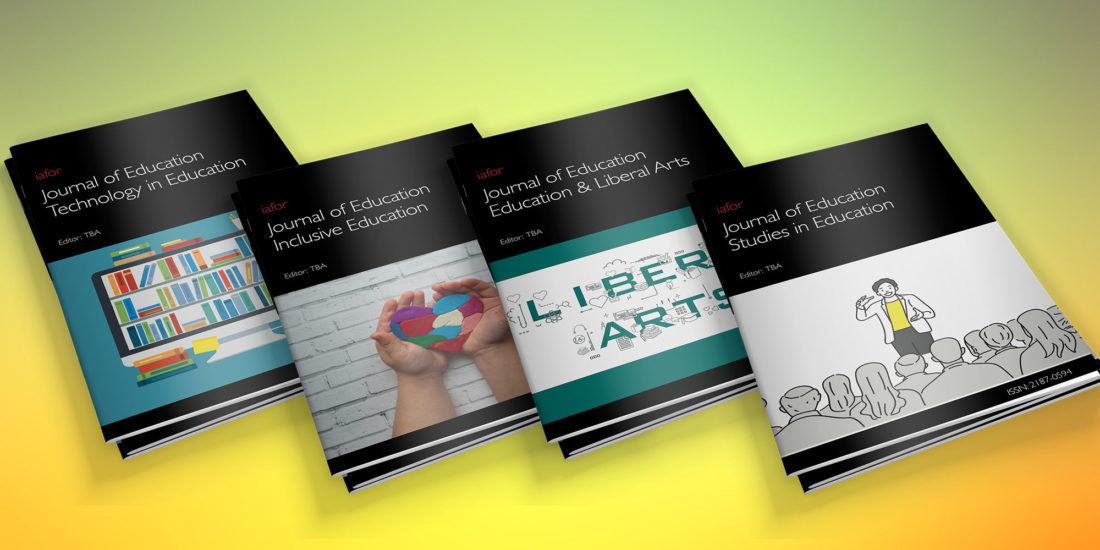Now approaching the publication of its eighth volume, the IAFOR Journal of Education, an internationally reviewed and editorially independent Open Access interdisciplinary journal indexed with Scopus and other indexing agencies, is moving into a new era.
The journal’s Editor-in-Chief, Dr Yvonne Masters, is calling for four Editors to join an Editorial Board comprising the Executive Editor, the Editor-in-Chief, the Publications Manager, and two already appointed Editors. The Editors will have responsibility for one journal issue per year. They will be assisted by two Associate Editors and a team of Senior Reviewers and Reviewers.
We are looking for experienced researchers and writers to act as Editors, one each for the following journal issues:
- Technology in Education
- Inclusive Education
- Education and the Liberal Arts
- Studies in Education
Information in Brief
Candidates for the role of Editor should have:
- a PhD in a relevant field;
- a strong publication record;
- prior experience as a peer reviewer for relevant journals;
- prior editorial experience;
- excellent English language skills;
- strong critical assessment abilities;
- excellent communication and time management skills.
If you are keen to gain further editorial experience and work with a team to enhance the IAFOR Journal of Education, please see below where where a full role description and the criteria to be addressed can be found. There are also instructions on how to submit your application.
Detailed Role Description
Each new Editor will be responsible for one issue per year devoted to each topic, one other issue will be published on Language Learning and one on Undergraduate Education (these editors have already been appointed). Education and the Liberal Arts and Inclusive Education will have a 2021 first issue while the others will be published in 2020. It is expected that the appointed editors will be integral to the appointment of associate editors and reviewers for their issue prior to submissions commencing.
Role Description – The key roles of journal editor are:
- to promote scholarship in the specialist field associated with the specific journal issue;
- to encourage new and established authors to submit articles;
- to establish a reliable panel of expert reviewers;
- to ensure that any feedback to authors is constructive;
- to offer feedback to reviewers when required;
- to ensure that deadlines are met;
- to liaise with the Publications Manager regarding layout and cover art; and
- to ensure that an issue is copy edited and submitted to the Editor-in-Chief for checking in a timely manner.
Responsibilities – The editor should:
- endeavour to be a leader in the specific field of practice underpinning the journal content as it helps the journal development, presence and standing within the international community.
- familiarise themselves with the Committee on Publication Ethics (COPE) ‘Code of Conduct and Best Practice Guidelines for Journal Editors’.
- familiarise themselves with the journal article template and APA referencing in order to assist in making decisions about articles at the first level of submission.
- work as a team with Associate Editors, and the Editor-in-Chief as needed, in making important decisions about final acceptance or rejection of papers, cases of plagiarism, or complaints from authors or reviewers.
Application
There should be three separate sections to the application.
- A cover letter (no more than 1 page) explaining why you wish to be editor of a particular issue.
- A current CV (no more than 4 pages) which outlines:
– your qualifications;
– employment history;
– research interests in the field; and
– publication record. - A statement explaining how you demonstrate the selection criteria outlined below. It can be useful to frame your response using the STAR technique (STAR = S ituation... T ask... A ction... R esult) where you use examples that demonstrate that you have that skill, knowledge or experience.
Selection Criteria:
- Prior reviewing and editorial experience in the required field.
- Demonstrated excellent organisational and project management skills, and the ability to multitask, work under pressure, prioritise conflicting demands, and adapt to changing deadlines.
- Proven ability to forge and maintain high-trust, respectful and collaborative working relationships, as well as working independently.
- Demonstrated pro-active, flexible and ‘hands on’ approach to work and ability to work effectively and achieve results in a changing environment.
- Proven strong written and verbal communication skills and strong negotiation skills to deal with authors.
Submitting Application
The application should be submitted by email, preferably as a pdf, by 5.00pm (JST), Monday, January 13, 2020. Your email subject line should be: Application Editor: Name of Issue (e.g. Technology in Education). Please note that you may only apply for ONE editorial position.
Dr Yvonne Masters
Editor-in-Chief
IAFOR Journal of Education
About the Journal
The IAFOR Journal of Education is an internationally reviewed and editorially independent interdisciplinary journal associated with IAFOR’s international conferences on education. Like all IAFOR publications, it is freely available to read online, and is free of publication fees for authors. The first issue was published in May 2013, and the journal continues to publish a minimum of two issues per year.
Indexed in: Scopus (from 2019), DOAJ, ERIC, EBSCO Discovery Service, Education Source, MIAR, TROVE, SHERPA/RoMEO, WorldCat and Google Scholar. DOIs are assigned to each published issue and article via Crossref.
Read the Latest Issue


